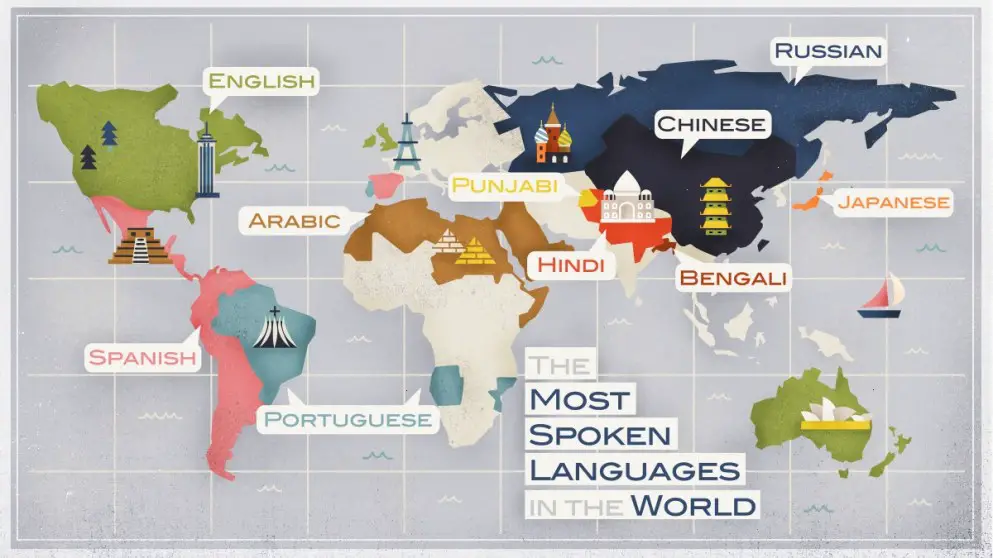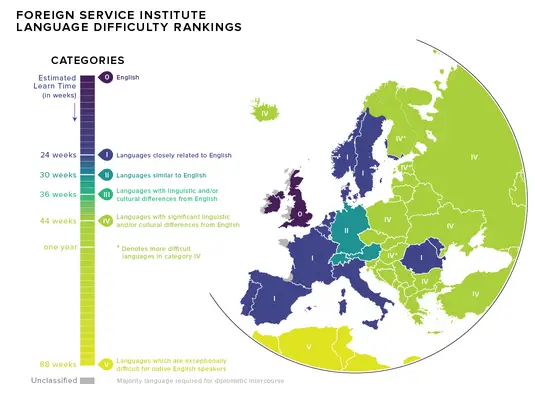Language and its importance
Introduction
Language is regularly what characterizes societies and nations the most. Regardless of whether you are talking one of the universes greatest dialects, similar to Spanish, English, or Mandarin, or a more modest, more detached language like Basque, Chinook, or Romani, this type of openness is of the utmost importance for practically every part of our lives. In this article, we will investigate those with the longest and most assorted letter sets.
Ranking languages
As per Ethnologue.com, there are 7117 communicated in dialects around the globe, and the work of estimating a dialects letter set is entirely minimal more confounded than it may appear. The principal issue is the manner by which to tally a letters in order. Take spanish for instance; the vowels ‘A, E, I, O, U’ all exist in its letters in order, however they additionally all have emphasized structures. Do these consider extra characters inside a letters in order, or would they say they are basically minor departure from existing letters? With the end goal of this article, we will say simply that. In the event that a language remembers a set rundown of letters for its letters in order, and doesn’t tally complemented characters or joined varieties, we will tally it without them. We additionally will exclude dialects, for example, Mandarin or Cantonese, where the term letters in order doesn’t straightforwardly apply. These dialects have ideographic composing frameworks, otherwise called pictographs, and don’t fall precisely into the letter set framework for which we will check.
Rank 1: Smaller Alphabets (21 - 26 Letters)
The majority of you perusing this will be acquainted with a portion of the dialects in this positioning. We are including these to offer setting to the size of dialects later on positions. How about we start for certain mainstream European dialects. English, has 26 letters dependent on Latin Script, as is German and French with 26 also, and Spanish with 27. Italian has an astounding 21 letters in its letter set, giving it the least in our first position.
Rank 2: Larger Alphabets (28 - 46 Letters)
So as we move past a portion of the dialects we’re utilized to, we begin to discover bigger and more unpredictable composing frameworks. Arabic for instance, has 28 letters in its language, which are all viewed as consonants, Arabic does obviously have vowels, yet they are rather appeared by a ‘diacritical imprint’ or glyph that is added to the current letters. At that point there is the Russian letter set comprising of 33 letters. 10 of these are vowels, 21 are consonants and an extra two ‘signs’ or ‘modifiers’ additionally used to make words. At last, in our subsequent position, we have Japanese. Presently, the facts demonstrate that Japanese is an ideographic language, with Kanji being the most well known of it’s three composing frameworks, yet not at all like Chinese, Japanese has two phonetic letters in order, hiragana and katakana, which can both be included in our rankings. The two dialects have an aggregate of 46 letters.
Rank 3: The Biggest Alphabets (50 - 75 Letters)
Presently we are in the higher class of letter set lengths, and we begin to break the 50 letters mark. Hindi, the most communicated in language in the entirety of India, has a letters in order comprising of 12 vowels, 33 consonants, and somewhere in the range of 5 and 7 compound characters, giving it an aggregate of somewhere in the range of 50 and 52 letters (This number changes among various areas of India). Next up we have Nepali, a language that verifiably has outgrown an area with long and complex composing frameworks. Nepali has 64 letters in its letter set, the biggest we have discussed up until this point, yet lamentably, it doesn’t take the best position. That delight tumbles to Khmer. As per the Guinness Book Of World Records, the Khmer Language has the biggest letters in order on the planet, with a sum of 74 letters, comprising of 33 consonants, 23 vowels and 12 free vowels. Regularly alluded to as Cambodian, Khmer is really spoken in numerous nations in Southeast Asia, including Thailand, Vietnam, and a few pieces of Laos. The language has an aggregate of 16 million local speakers.
Fun facts
Mongolian has one of the longest word lengths, by letter, on the planet, with a normal of 13 letters for every word!
Rotokas, a native language to Papua New Guinea is the littlest known language on the planet with a sum of 12 letters!
The term ‘Digraphia’ alludes to a language that has different composing frameworks. This is normal around the globe, especially in India where Perso-Arabic content and Devanagari are frequently given together on street indications.
Khmer isn’t only the name of a language, it was a realm as well! The Khmer Kingdom ruled over a lot of Southeast Asia between the years 802 to 1431.
Number of living dialects: 6912
Number of those dialects that are almost wiped out: 516
Language with the best number of local speakers: Mandarin Chinese
The language is spoken by the best number of non-local speakers: English (250 million to 350 million non-local speakers)
Nation with the most dialects spoken: Papua New Guinea has 820 living dialects
How long have dialects existed: Since around 100,000 BC
First language ever composed: Sumerian or Egyptian (around 3200 BC)
Most established composed language still in presence: Chinese or Greek (around 1500 BC)
Language with the most words: English, approx. 250,000 unmistakable words
Language with the least words: Taki (likewise called Sranan), 340 words. Taki is an English-based Creole spoken by 120,000 in the South American nation of Suriname.
Language with the briefest letters in order: Rotokas (12 letters). Approx. 4300 individuals communicate in this East Papuan language. They live basically in the Bougainville Province of Papua New Guinea.
The language with the least sounds (phonemes): Rotokas (11 phonemes)
The language with the most sounds (phonemes): !Xóõ (112 phonemes). Approx. 4200 speak !Xóõ, by far most of whom live in the African nation of Botswana.
Language with the least consonant sounds: Rotokas (6 consonants)
Language with the most consonant sounds: Ubyx (81 consonants). This language of the North Causasian Language family, when spoken in the Haci Osman town close to Istanbul, has been terminated since 1992. Among living dialects, !Xóõ has the most consonants (77).
Language with the least vowel sounds: Ubyx (2 vowels). The connected language Abkhaz additionally has 2 vowels in certain lingos. There are roughly 106,000 Abkhaz speakers living basically in Georgia.
Language with the most vowel sounds: !Xóõ (31 vowels)
The most generally distributed language: English
Language with the least sporadic action words: Esperanto
Language which has won the most Oscars: Italian (12 Academy Awards for Best Foreign Film)
The most interpreted report: Universal Declaration Of Human Rights, composed by the United Nations in 1948, has been converted into 321 dialects and vernaculars.
The most widely recognized consonant sounds on the planet’s dialects:/p/,/t/,/k/,/m/,/n/
Longest word in the English language: pneumonoultramicroscopicsilicovolcanoconiosis (45 letters)
20 most widely spoken languages in 2020
1. English
What number of individuals communicate in English? 1,132 million speakers
Did you know? “I”, “we”, “who”, “two” and “three” go back a huge number of years, making them the most seasoned words in the English language.
On the off chance that you can comprehend this article and trade a few words in English, you’re as of now in karma! English is as yet the most-communicated language around the globe, not because of its local speakers alone, but since numerous others learn it as a subsequent language. It is a piece of the West Germanic language family and is available in six of seven landmasses as an authority language (with 64% of its local speakers being Americans). It is definitely justified even despite the exertion as our most widely used language and a vital instrument for business between societies!
2. Mandarin Chinese
What number of individuals communicate in Mandarin Chinese? 1,117 million speakers
Did you know? Utilizing two eights of every column (88) is Chinese web slang for “bye”.
The second most communicated in language on the planet is Mandarin Chinese. It has the biggest number of local speakers of any language and is spoken by 70% of every single Chinese speaker. That makes it the biggest of all Chinese tongues by a wide margin. It is likewise an extraordinary motivation to study this 1000-year old goliath! Many dread learning Mandarin because of its 50,000 distinct characters – which, in contrast with the 26-letter letters in order, are very scary – yet 2,500 characters would be sufficient for ordinary Mandarin to be perceived. We believe it merits the devotion!
3. Hindi
What number of individuals communicate in Hindi? 615 million speakers
Did you know? The Hindi language doesn’t utilize “the”, or what we call an unequivocal article.
Many may connect the Hindi language with beautiful Bollywood motion pictures or the disordered traffic in Delhi. Be that as it may, Hindi has quite a lot more to give, for example, 615 million possible companions and admittance to an amazing assortment of societies! Giving this Indo-Aryan language a possibility will permit you to find not just unimaginable music, engaging movies, and endearing individuals, it will likewise permit you to see exactly how intently it actually works with English. Indeed, Hindi gave English words like a master, symbol, mantra, night robe, cheetah, lodge, and cleanser.
4. Spanish
What number of individuals communicate in Spanish? 534 million speakers
Did you know? Spanish is likewise the authority language of a nation in Central Africa, Equatorial Guinea.
We ramble about Spanish around here, and how should we not? This melodic, bright Romance language vanquishes new hearts in any place it goes. It has likewise seen an unimaginable improvement in its number of speakers because of its developing social impact. Many trust Spanish is threatening due to the moved “r”, the sexes, and the perplexing action word formations. Nonetheless, we think those are largely subtleties when you think about the master plan: admittance to 21 Spanish-talking nations, understanding your number one gathering melodies and dominating quite possibly the most mentioned dialects these days!
5. French
What number of individuals communicate in French? 280 million speakers
Did you know? 75% of French residents didn’t communicate in French as a first language when the French Revolution occurred. All things considered, they communicated in local dialects.
French keeps on being a social goliath, yet the explanation probably won’t be as wellParisienne as you may might suspect! Africa is really set to be the fate of the French language, as 45% of all French speakers were situated in Africa in 2018. The Francophone populace is additionally expected to arrive at 572 million speakers continuously 2030 because of the developing populace in the African landmass. Having said that, France keeps on being a colossal fascination and a vital nation for world governmental issues. The social assortment and rich history it gives us admittance to is a great motivation to begin learning this Romance language today.
The main 6 – 20 most communicated in dialects on the planet
Standard Arabic – 274 million speakers
Bengali – 265 million speakers
Russian – 258 million speakers
Portuguese – 234 million speakers
Indonesian – 199 million speakers
Urdu – 170 million speakers
Standard German – 132 million speakers
Japanese – 128 million speakers
Swahili – 98 million speakers
Marathi – 95 million speakers
Telugu – 93 million speakers
Western Punjabi – 93 million speakers
Wu Chinese – 82 million speakers
Tamil – 81 million speakers
Turkish – 80 million speakers
Endangered list of languages
UNESCO provides a classification system to show just how ‘in trouble’ the language is:
Vulnerable - most children speak the language, but it may be restricted to certain domains (e.g., home)
Definitely endangered - children no longer learn the language as a ‘mother tongue’ in the home
Severely endangered - language is spoken by grandparents and older generations; while the parent generation may understand it, they do not speak it to children or among themselves
Critically endangered - the youngest speakers are grandparents and older, and they speak the language partially and infrequently
Extinct - there are no speakers left

Language ranking difficulty for English Speakers

Learning another dialect as a grown-up is huge endeavor – so on the off chance that you need the best an incentive for your time, pick carefully.
Classification I: The Quick Ones
Classification I dialects are the least demanding for English speakers, who can arrive at perusing and talking capability inside about a large portion of a time of extreme investigation. There is a blend of Romance and Germanic dialects in this arrangement, including Dutch, Swedish, French, Spanish, and Italian.
It very well may be astounding likewise to discover that Afrikaans is in this “most straightforward” classification also. It utilizes 26 letters in its letters in order like English (despite the fact that it likewise contains extra phonetic sounds), and shares a ton practically speaking with current Dutch.
Classification II: Es ist schwer zu sagen
Despite the fact that German is firmly identified with English, there are sentence structure idiosyncrasies that knock it up in trouble. FSI gauges it would require 30 weeks of exceptional investigation to get capable in German.
Classification III: Intermediate
Classification III dialects are predominantly spoken in Southeast Asia, and they incorporate Indonesian and Malay. Swahili likewise considers a Category III language. (Note: there are no Category III dialects spoken in Europe.)
Class IV: For individuals who like a test
Classification IV incorporates the most testing European dialects for English speakers to get. Here you’ll discover Slavic and Baltic dialects, for example, Polish, Croatian, and Latvian, just as Greek, Turkish, and Icelandic.
This classification additionally incorporates Finnish, Estonian and Hungarian. These Uralic dialects have the differentiation of being especially trying for English speakers to dominate as they share little for all intents and purpose with some other European dialects. FSI gauges it would require a time of serious examination to get capable in these dialects.
Classification V: For individuals who truly like a test
Dialects in classification V are the most trying for English speakers since they by and large have totally new contents and social presumptions. These dialects are generally normal in Asia and the Middle East.
While Mandarin, Arabic, and Korean are adequately hard to appreciate, Japanese has gained notoriety for being the hardest in this gathering much obliged, to some extent, to numerous composing styles.
Dominating Japanese could require years, yet FSI gauges that it’ll be in any event 88 weeks before you’re visiting your way through Tokyo.
Reasons for learning any foreign language
At the point when most of individuals state “I will get familiar with another dialect this year” they never truly think about the significance of learning an unknown dialect and how it can help them for quite a long time to come. Learning a subsequent language won’t be a brisk assignment, indeed, it requires numerous years to consummate your discourse designs so local speakers will get you and not give you a befuddled sideways head gesture. You’ll should be devoted and stay with it, regardless of whether you’re simply learning in your extra time, you should become familiar with somewhat to a great extent regardless of whether you’re simply looking into what you realized a week ago. Keeping the substance new in your psyche will help you when you choose to get familiar with another part or set of words and that implies you won’t be slowed down because of work or individual commitments.
There are numerous reasons why it is imperative to become familiar with a second, third, or even fourth language and the base of all that is you simply need to grow your brain somewhat more than you as of now have. For what reason is it significant, you inquire? Indeed, you will extend your psyche and notice that you’re really getting more intelligent and you’re recollecting much more over time essentially on the grounds that you’re examining a subsequent language. It’s astounding how your brain functions, and very few individuals figure learning a subsequent language can really assist you with recollecting things, yet you’ll basically be placing your psyche in the weight room and experiencing a decent exercise. The more you work out your psyche, the more you recollect, and the faster you will complete your undertakings.
Reason 1: You love the way of life and plan to travel
Many individuals like to get familiar with a second or third language since they travel to explicit objections a couple of times each year and simply need to address local people in the zone. Regardless of whether you were to read the language for a couple of months you’d be exceptional to hold a little discussion with anybody in the territory you travel to.
Reason 2: You need your resume to look better
At the point when you’re reviewing a resume you will currently have the option to include the particular dialects you know. This will show your potential bosses that you’ve set aside the effort to gain proficiency with a second or third language despite the fact that it might never help you in the business world. Managers like this since you accomplished something instructive that you didn’t need to and it will likewise help on the grounds that your conceivable boss will realize you could converse with customers or clients that may communicate in the dialects you know.
Reason 3: Your fantasy work requires it
A few people like learning explicit dialects since they need to extend their psyche while others do it for a fantasy work they’ve had their eye on. Truly, a few positions expect you to be multilingual and this implies the quantity of openings for these positions is minuscule. By knowing the particular dialects essential for these positions you will get your application and resume pushed to the highest point of the heap and likely get a get back to for the work over the individuals who just know a solitary language.
Reason 4: You separate language obstructions
Regardless of whether you’re not learning a language for business purposes, you will have the option to separate language obstructions when making the rounds doing your everyday errands. What number of individuals have you seen at a Mexican eatery communicating in Spanish when they request? The server/server that learned Spanish as their first language will probably have the option to take your request a lot simpler, which will make a connection among you, and it’s all since you required some investment to get familiar with a second language that you truly didn’t need to.
Reason 5: You’ll increment mind action
Perhaps the most useful things that come from learning a second language in 2019 is your mind will turn out to be more dynamic. At the point when your cerebrum turns out to be more dynamic you will see it’s simpler to recall things and you will feel more satisfied toward the finish of every day. Discovering some new information, other than the subsequent language you’re examining, will appear to stick inside your memory all since you’ve been keeping your cerebrum dynamic.
Probably the greatest thing you need to recollect when learning another dialect is that you’ll have to stay with it. You need to regard it as though you were stepping through an exam on it every month, to make sure you remember anything, and you will see you’re not failing to remember a lot of when talking in your second or third language. You need to recollect the significance of learning unknown dialects isn’t to host a get-together stunt to intrigue a kid or young lady however it’s to extend your mind and learn more than you recently knew.
Learning another dialect isn’t care for riding a bicycle, you can’t require months or years to learn something and hope to have the option to get it and sell away following 10 years of not doing it. You’ll have to practice your psyche constantly over time to keep the language new inside your brain and not set yourself back a year or two since you go sluggish.
Many individuals will gain proficiency with an unknown dialect while in school since they’re either compelled to or they accepting it as an elective since they were intrigued. It doesn’t make a difference in case you’re in school or simply need to learn, you should be committed and stay with it in the event that you truly need to hold the data you’re going over the long run and time once more.
Eventually, learning a second or even a third language can help you land your fantasy work or simply get you utilized at another organization you see as a venturing stone. Bosses will see you are bilingual, or trilingual, and see potential in you since realizing various dialects will in general be an indication of knowledge for certain individuals. You may see the significance of learning an unknown dialect and that implies you’ll be on the ball with regards to numerous things throughout everyday life.




